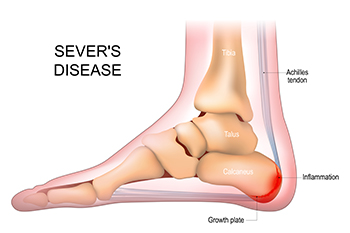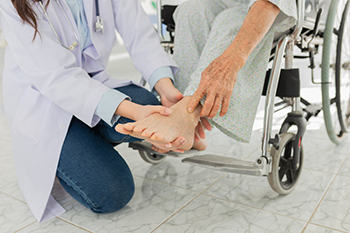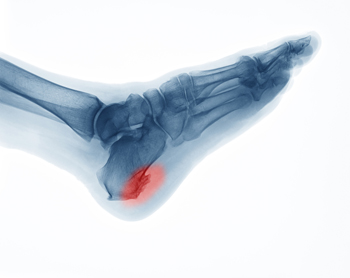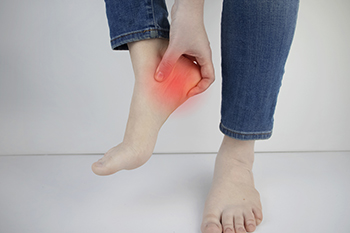Items filtered by date: September 2023
Symptoms and Effective Treatment for Sever’s Disease

Sever's disease, also known as calcaneal apophysitis, is a common but often misunderstood condition affecting children and adolescents, especially those active in sports. It is not a traditional disease but rather a painful growth plate disorder. Understanding its symptoms and appropriate treatment is vital for parents and young athletes. The hallmark symptom of Sever's disease is heel pain, typically at the back or along the bottom of the heel. Pain tends to worsen during or after physical activities and may cause limping or discomfort when walking or running. The condition arises when the growth plate at the back of the heel bone becomes inflamed due to repetitive stress. Fortunately, Sever's disease is treatable. Getting adequate rest and taking over-the-counter pain relievers can help alleviate discomfort. Stretching exercises and may also be recommended to improve flexibility, and strengthen the calf muscles. Wearing supportive footwear with cushioned insoles may help reduce heel pressure. By recognizing the symptoms and seeking appropriate treatment, parents and young athletes can manage Sever's disease effectively, allowing for a smoother path to recovery and a return to their favorite activities. If your active child has heel pain, it is strongly suggested that you consult a podiatrist who can accurately diagnose and treat Sever’s disease.
Sever's disease often occurs in children and teens. If your child is experiencing foot or ankle pain, see Gary Cockrell, DPM from Tennessee. Our doctor can treat your child’s foot and ankle needs.
Sever’s Disease
Sever’s disease is also known as calcaneal apophysitis, which is a medical condition that causes heel pain I none or both feet. The disease is known to affect children between the ages of 8 and 14.
Sever’s disease occurs when part of the child’s heel known as the growth plate (calcaneal epiphysis) is attached to the Achilles tendon. This area can suffer injury when the muscles and tendons of the growing foot do not keep pace with bone growth. Therefore, the constant pain which one experiences at the back of the heel will make the child unable to put any weight on the heel. The child is then forced to walk on their toes.
Symptoms
Acute pain – Pain associated with Sever’s disease is usually felt in the heel when the child engages in physical activity such as walking, jumping and or running.
Highly active – Children who are very active are among the most susceptible in experiencing Sever’s disease, because of the stress and tension placed on their feet.
If you have any questions, please feel free to contact our offices located in Brentwood and Madison, TN . We offer the newest diagnostic and treatment technologies for all your foot and ankle injuries.
Essential Foot Care Tips for Seniors

As one ages, taking care of the feet becomes increasingly important. Neglecting foot health can lead to discomfort and mobility issues. There are several valuable foot care tips for seniors to ensure their feet remain in good condition. Maintaining proper hygiene can be accomplished by washing the feet daily, drying them thoroughly, and applying a moisturizer to prevent dry, cracked skin. Regularly inspect the feet for any cuts, sores, or changes in color, which may be signs of underlying issues like diabetes or circulatory problems. Select comfortable, well-fitting shoes that have ample arch support and cushioning to reduce the risk of foot pain and deformities. Keep your toenails trimmed straight across to prevent ingrown toenails. If you have difficulty reaching your feet, seek assistance from a family member or caregiver. It is beneficial to engage in foot exercises that can help to improve circulation and maintain flexibility. If you would like more information about foot care tips for elderly people, it is suggested that you speak with a podiatrist who can provide you with the knowledge you are seeking.
Proper foot care is something many older adults forget to consider. If you have any concerns about your feet and ankles, contact Gary Cockrell, DPM from Tennessee. Our doctor can provide the care you need to keep you pain-free and on your feet.
The Elderly and Their Feet
As we age we start to notice many changes in our body, but the elder population may not notice them right away. Medical conditions may prevent the elderly to take notice of their foot health right away. Poor vision is a lead contributor to not taking action for the elderly.
Common Conditions
- Neuropathy – can reduce feeling in the feet and can hide many life-threatening medical conditions.
- Reduced flexibility – prevents the ability of proper toenail trimming, and foot cleaning. If left untreated, it may lead to further medical issues.
- Foot sores – amongst the older population can be serious before they are discovered. Some of the problematic conditions they may face are:
- Gouging toenails affecting nearby toe
- Shoes that don’t fit properly
- Pressure sores
- Loss of circulation in legs & feet
- Edema & swelling of feet and ankles
Susceptible Infections
Diabetes and poor circulation can cause general loss of sensitivity over the years, turning a simple cut into a serious issue.
If you have any questions please feel free to contact our offices located in Brentwood and Madison, TN . We offer the newest diagnostic and treatment technologies for all your foot and ankle needs.
Definition and Root Causes of Heel Spurs

Heel spurs are bony growths that form on the underside of the heel bone or the back of the heel where the Achilles tendon attaches. These spurs are not sharp, unlike their name suggests, but they can cause excruciating discomfort by irritating the surrounding tissues. They often develop as a response to long-term strain on the foot's ligaments and muscles. Repetitive activities, such as running or standing for extended periods, improper footwear, and being overweight can contribute to the formation of heel spurs. Additionally, individuals with flat feet or high arches are more susceptible. While heel spurs may not always cause pain, when they do, it's typically due to inflammation of the nearby soft tissues. Understanding the definition and underlying causes of heel spurs empowers individuals to make informed choices in managing and preventing this sometimes debilitating foot condition. If you have heel pain, it is strongly suggested that you consult a podiatrist who can effectively diagnose and treat heel spurs.
Heel spurs can be incredibly painful and sometimes may make you unable to participate in physical activities. To get medical care for your heel spurs, contact Gary Cockrell, DPM from Tennessee. Our doctor will do everything possible to treat your condition.
Heels Spurs
Heel spurs are formed by calcium deposits on the back of the foot where the heel is. This can also be caused by small fragments of bone breaking off one section of the foot, attaching onto the back of the foot. Heel spurs can also be bone growth on the back of the foot and may grow in the direction of the arch of the foot.
Older individuals usually suffer from heel spurs and pain sometimes intensifies with age. One of the main condition's spurs are related to is plantar fasciitis.
Pain
The pain associated with spurs is often because of weight placed on the feet. When someone is walking, their entire weight is concentrated on the feet. Bone spurs then have the tendency to affect other bones and tissues around the foot. As the pain continues, the feet will become tender and sensitive over time.
Treatments
There are many ways to treat heel spurs. If one is suffering from heel spurs in conjunction with pain, there are several methods for healing. Medication, surgery, and herbal care are some options.
If you have any questions feel free to contact our offices located in Brentwood and Madison, TN . We offer the latest in diagnostic and treatment technology to meet your needs.
Heel Pain Can Be Treated!
What are the Causes and Treatments for Plantar Fasciitis?

Plantar fasciitis, a prevalent foot condition, can cast a shadow on even the most active lifestyles. It occurs when the plantar fascia, which is defined as the ligament connecting the heel bone to the toes, becomes inflamed or strained. There are various reasons for plantar fasciitis, often stemming from repetitive stress, poor footwear choices, obesity, or abnormal foot structures, such as flat feet. Symptoms encompass sharp heel pain, especially during the first steps in the morning or after periods of inactivity. As painful as this condition can be, there are various options that can be implemented. Treatment methods can range from rest, and taking over-the-counter pain medications to targeted exercises that stretch and strengthen the plantar fascia. In more severe cases, podiatrists may recommend custom orthotics or corticosteroid injections. With proper care and attention, managing plantar fasciitis can help individuals step back into a life unhindered by foot discomfort. If you have developed plantar fasciitis, it is strongly suggested that you are under the care of a podiatrist who can determine what the best course of treatment is for you.
Plantar fasciitis can be very painful and inconvenient. If you are experiencing heel pain or symptoms of plantar fasciitis, contact Gary Cockrell, DPM from Tennessee. Our doctor can provide the care you need to keep you pain-free and on your feet.
What Is Plantar Fasciitis?
Plantar fasciitis is the inflammation of the thick band of tissue that runs along the bottom of your foot, known as the plantar fascia, and causes mild to severe heel pain.
What Causes Plantar Fasciitis?
- Excessive running
- Non-supportive shoes
- Overpronation
- Repeated stretching and tearing of the plantar fascia
How Can It Be Treated?
- Conservative measures – anti-inflammatories, ice packs, stretching exercises, physical therapy, orthotic devices
- Shockwave therapy – sound waves are sent to the affected area to facilitate healing and are usually used for chronic cases of plantar fasciitis
- Surgery – usually only used as a last resort when all else fails. The plantar fascia can be surgically detached from the heel
While very treatable, plantar fasciitis is definitely not something that should be ignored. Especially in severe cases, speaking to your doctor right away is highly recommended to avoid complications and severe heel pain. Your podiatrist can work with you to provide the appropriate treatment options tailored to your condition.
If you have any questions please feel free to contact our offices located in Brentwood and Madison, TN . We offer the newest diagnostic and treatment technologies for all your foot and ankle needs.

